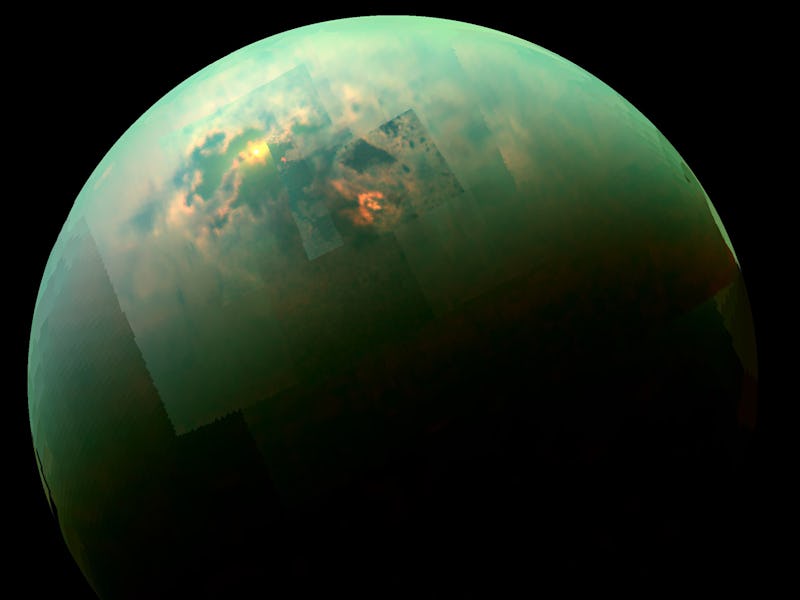Scientists Say Titan Could Host Very Cold Extraterrestrial Life
Just as NASA awards a new contract to build a Titan-exploring 'Aerobot' spacecraft.

We typically look at water — especially surface water — as an essential ingredient for life on extraterrestrial worlds. But perhaps water is not as essential to organisms arising elsewhere in the universe as we think. As it turns out, Saturn’s biggest moon, Titan, may contain the chemical ingredients needed to generate primitive life without water, say scientists from Cornell University.
Titan is worlds apart (literally and figuratively) from Earth, but the two share the distinction of being the only celestial bodies with surfaces shaped by lakes, oceans, rivers, and precipitation of liquids. On Titan, however, there’s no water cycle — there’s a methane cycle. A new study published in the Proceedings of the National Academies suggests that the planet’s methane could create a chemical foundation for life to arise.
The moon possesses an incredibly cold atmosphere (about -290 degrees Fahrenheit) meaning any kind of life-forming chemistry needs to occur at deathly low temperatures. In the case of water, this is a non-starter. In the case of methane, however, the researchers find that the sun’s energy — even all the out to the distance of Saturn — could be absorbed by concentrations of hydrogen cyanide on Titan’s surface and react to form precursor molecules that could lead to organic materials like amino acids and nucleic acids (aka proteins and DNA).
Yowza, that’s pretty exciting itself. Unfortunately, the study’s findings are based on computer models — we have yet to actually dig down into Titan’s surface and find out whether this is actually happening or not.
TWA
A search for aliens on Titan might happen sooner than we think. Global Aerospace Corporation announced Wednesday that it had just struck a new collaboration with Northrop Grumman to develop a prototype for a spacecraft that would explore Titan. Under a 2016 Phase I NASA Small Business Innovation Research contract, the two companies will build the Titan Winged Aerobot (TWA), an ultra-power-efficient, low-cost vehicle for studying Saturn’s moon, and test it here on Earth.
TWA is basically a hybrid of a balloon and a glider, able to maneuver in three dimensions while using a minimum amount of energy. With a uniquely buoyant design, TWA could hopefully navigate the harsh atmosphere and ascend and descend without the need for propulsion. Although the spacecraft will be hanging in the air, it could be fitted with a potential to deliver probes to the ground to study the surface environment and geology of Titan directly.
Will TWA actually move beyond just the prototyping phase? It’s unclear. What’s for certain, however, is that excitement around Titan won’t be diminishing anytime soon. Aliens or not, it’s an exotic world fully worth investigating — and hopefully we get around to that soon.